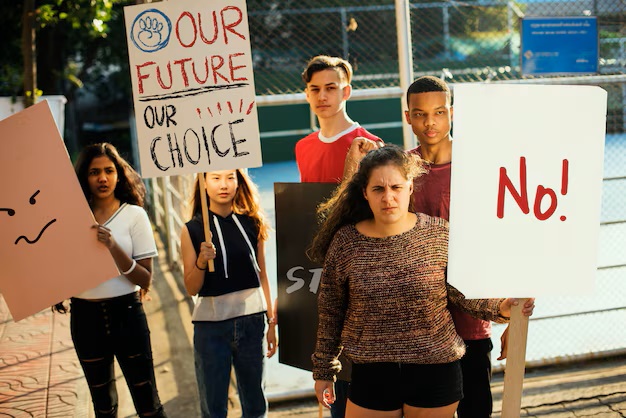A recent development has put a spotlight on the regulations governing the ownership and carrying of firearms in certain regions. The discussion revolves around how such policies align with broader principles of individual rights and public safety. In particular, the examination of these laws is raising important questions about their implications and enforceability.
Concerns have been raised about the effectiveness and fairness of the existing framework, with advocates on both sides presenting compelling arguments. While some believe that stricter controls are necessary to ensure community safety, others argue that such measures infringe upon fundamental liberties. This clash of perspectives sets the stage for a significant legal debate.
As stakeholders await further clarity, the implications of these deliberations could reverberate beyond state lines, influencing firearm policies across the nation. The discourse invites a thorough analysis of how best to balance individual freedoms against collective security, a challenge that remains ever relevant in today’s society.
Overview of Maryland Handgun Regulations
The framework governing the ownership and use of firearms in the state is designed to balance individual rights with public safety. Various laws and measures aim to regulate this aspect of personal freedom while ensuring the protection of the community.
- Licensing: Individuals must acquire a permit to carry a firearm in public, requiring a thorough application process and background checks.
- Purchase Requirements: Prospective buyers must undergo specific protocols, including waiting periods and eligibility assessments.
- Training Mandates: Certification in safety training is often required to ensure responsible handling and use of firearms.
- Restrictions: Certain locations, such as schools and government buildings, prohibit the carrying of firearms, contributing to safer environments.
- Storage Guidelines: There are recommendations and requirements for the safe storage of firearms to prevent accidental use and unauthorized access.
These facets of the law reflect an ongoing dialogue between lawmakers and the community regarding personal freedom, safety, and responsibility in firearm ownership and use.
Federal Appeals Court’s Role in Gun Laws
The judicial system plays a pivotal role in shaping the framework surrounding firearm legislation. Through careful deliberation and interpretation of established laws, these institutions influence the balance between individual rights and societal safety. Their rulings provide clarity and guidelines, which help determine the extent of permissible actions related to gun ownership and use.
Judicial oversight serves as a crucial check on legislation. It examines the compatibility of existing rules with constitutional provisions, particularly in relation to the right to bear arms. This oversight can prompt reforms or re-evaluations of policies that may be deemed too restrictive or, conversely, insufficient in safeguarding public welfare.
Moreover, legal precedents established by these decisions mold the landscape of firearm statutes across the nation. They resonate beyond immediate cases, influencing future legislative efforts and community attitudes toward gun ownership. As such, the judiciary emerges as a powerful entity in navigating the complex discourse surrounding weapon laws and individual freedoms.
Impact of Regulations on Gun Owners
The influence of legislative measures on firearm enthusiasts and owners can be profound, shaping their experiences and interactions with their possessions. Such stipulations can alter not only the way individuals acquire and maintain their weapons but also how they perceive their rights and responsibilities within society.
Legal Constraints can lead to increased scrutiny and restrictions, impacting ownership rates and the enthusiasm of individuals who wish to engage in hunting, sport shooting, or self-defense. The complexity of compliance can deter prospective owners from pursuing their interests, fostering an environment of uncertainty and concern.
Moreover, public perception can shift dramatically in response to new laws. Owners may feel stigmatized or targeted, contributing to a divide between gun enthusiasts and those who advocate for stricter controls. This tension can foster misunderstandings about the intentions and attitudes of responsible firearm owners.
Ultimately, the balance between safety measures and individual freedoms remains delicate, with ongoing debates highlighting the need for dialogue. As legislation evolves, the implications for those who value their right to bear arms continue to be a focal point of national conversation.
Historical Context of Firearm Legislation
The evolution of laws governing the ownership and use of weapons in society is a reflection of changing values, safety concerns, and social dynamics. Over time, various entities have grappled with the balance between individual rights and collective security, leading to a complex tapestry of legislation that varies widely across different regions and eras.
Early Legislative Developments
In the early days of the United States, the right to bear arms was often perceived as a fundamental aspect of personal and communal defense. Founding documents established the notion of self-reliance, where firearm ownership was deemed essential for protection against both external threats and potential tyranny. As the nation grew, these principles were codified into legal frameworks, laying the groundwork for modern discussions surrounding ownership rights.
The Shift Towards Regulation
As society evolved, so did the understanding of the implications of firearms in daily life. Increasing urbanization, coupled with rising concerns over crime, prompted lawmakers to introduce more stringent measures aimed at controlling access to weapons. These changes sparked debates over the necessity and impact of such controls, setting the stage for the ongoing dialogue about the balance between individual freedoms and public safety.
Arguments Presented in Court Case
The recent legal proceedings have brought to light various perspectives surrounding the controversy of firearm policies. The discourse involves contrasting views on the balance between individual rights and public safety, generating a multifaceted debate that captures the attention of both legal scholars and the general public.
Proponents of Current Policies argue that existing measures are essential for maintaining security within communities. They emphasize the potential risks associated with lax regulations, citing statistical data that suggests a correlation between accessible firearms and increased incidents of violence. This group contends that reasonable limitations are a necessary compromise to foster a safer society.
Opponents of These Policies assert that such constraints infringe upon constitutional liberties, particularly the right to possess and bear arms. They present historical context and legal precedents as evidence, arguing that overly restrictive measures disproportionately impact law-abiding citizens while doing little to deter criminal behavior. This faction advocates for the protection of personal freedoms and denounces any attempts at curbing rights as unnecessary and unjust.
The discussions within the proceedings reflect a broader societal dilemma, prompting ongoing examination of how best to navigate the complex interplay between individual freedom and collective safety. Each side offers compelling arguments, making it clear that the implications of this case could resonate well beyond the immediate legal framework.
Potential Implications for Future Legislation
The recent developments surrounding firearm policies may significantly influence forthcoming legislative actions across the country. Policymakers are likely to reassess current laws, leading to a broader discussion on the balance between public safety and individual rights.
Key considerations for future regulatory measures may include:
- Enhanced understanding of constitutional rights related to weapon ownership.
- Increased scrutiny of existing laws and their effectiveness in promoting safety.
- Possibility of harmonization of policies at the state and national levels.
- Potential for greater public engagement in debates surrounding firearm laws.
- The need for data-driven approaches to inform future legislation.
As the conversation continues, lawmakers may explore innovative solutions that address community concerns while respecting individual liberties. This evolving landscape could lead to a more tailored approach to weapon policies that reflect the diverse needs of various populations.
- Possible introduction of new background check systems.
- Review of age restrictions and eligibility criteria for firearm possession.
- Consideration of measures aimed at reducing gun violence through education and prevention programs.
In summary, the implications of recent judicial scrutiny are likely to prompt legislators to rethink traditional frameworks and consider more adaptive strategies that better serve society as a whole.
Q&A: Federal appeals court skeptical maryland handgun rules
What is the main issue being questioned by the Federal Appeals Court regarding Maryland’s handgun regulations?
The main issue at hand is the constitutionality and effectiveness of Maryland’s handgun regulations, particularly pertaining to the requirements for obtaining a handgun permit. The court is examining whether these regulations infringe on the Second Amendment rights of individuals and whether they impose undue burdens on law-abiding citizens seeking to carry firearms for self-defense.
How might the Federal Appeals Court’s decision impact gun laws in other states?
The Federal Appeals Court’s ruling could set a significant legal precedent that might influence gun laws across the nation. If the court finds that Maryland’s regulations are unconstitutional, it could encourage challenges to similar laws in other states. This could lead to a broader interpretation of the Second Amendment, potentially making it easier for individuals to obtain permits and carry handguns in various jurisdictions.
What arguments are being presented by advocates for gun rights in this case?
Advocates for gun rights argue that Maryland’s handgun regulations are excessively restrictive and violate individuals’ constitutional right to bear arms. They contend that the process to obtain a permit is cumbersome and discourages responsible gun ownership. Furthermore, they assert that law-abiding citizens should not face unnecessary hurdles when seeking to protect themselves and their families, especially in light of rising crime rates in some areas.
What are the potential consequences if the Federal Appeals Court rules against Maryland’s handgun regulations?
If the Federal Appeals Court rules against Maryland’s handgun regulations, the immediate effect could be the invalidation of the current permitting process, allowing more individuals greater access to carrying handguns. This could lead to an increase in the number of citizens carrying concealed weapons, which may elevate concerns about public safety and law enforcement’s ability to regulate firearms. Additionally, such a ruling may prompt legislative changes aimed at revising or overhauling existing gun laws to align with the court’s decision.
What is the historical context of gun regulation debates in the United States, particularly regarding the Second Amendment?
The debate over gun regulations in the United States has deep historical roots, largely centered on the Second Amendment, which states, “the right of the people to keep and bear Arms, shall not be infringed.” Over the years, this has been interpreted in various ways. Landmark Supreme Court cases, such as District of Columbia v. Heller (2008), affirming an individual’s right to possess firearms for self-defense, and McDonald v. City of Chicago (2010), which applied this right to the states, have significantly shaped the discourse. Maryland’s handgun regulations are part of a broader narrative where states grapple with balancing public safety measures while respecting constitutional rights, leading to ongoing legal challenges and differing opinions on appropriate gun control measures.
What implications does the 4th Circuit’s ruling in Maryland’s gun laws have on the rights of residents to obtain handguns?
The 4th Circuit’s ruling in Maryland’s gun laws, particularly in light of the Supreme Court’s 2022 ruling in New York State Rifle and Pistol Association v. Bruen, has significant implications for the rights of Maryland residents to obtain handguns. The court of appeals examined whether Maryland’s rules for purchasing handguns could survive a legal challenge based on the historical tradition of firearm regulation in the U.S. During oral arguments, federal judges appeared skeptical during an argument Friday regarding the constitutionality of Maryland’s 2013 law requiring a handgun qualification license. This skepticism indicates that the court may be leaning towards expanding gun rights and affirming the right to carry a handgun in public, aligning with the Supreme Court’s emphasis on individual gun rights. The outcome of this ruling may affect the application process for purchasing handguns, potentially making it easier for Maryland residents to obtain the necessary licenses and purchase a handgun.
How did the federal judiciary approach the argument regarding the historical tradition of firearm regulation in Maryland?
In reviewing the Maryland firearm safety act of 2013, the federal judiciary focused heavily on the historical tradition that underpins gun regulation in the U.S. The circuit court of appeals, particularly Judge Harvie Wilkinson III, explored whether the state’s restrictions align with the Supreme Court’s 2022 ruling, which emphasized the importance of historical context in evaluating gun rights. During the proceedings, the three-judge panel indicated that the historical tradition could support the argument that Maryland’s rules for purchasing handguns might be unconstitutional if their infringement on the right to possess guns is not justified by a longstanding regulatory practice. This legal inquiry not only addresses the state’s approach to gun control but also positions Maryland’s gun laws in the broader context of federal and state regulations regarding the right to carry firearms.
What challenges does the Maryland gun rights group face in light of the recent legal developments in the 4th Circuit?
The Maryland gun rights group faces several challenges following the recent legal developments in the 4th Circuit regarding gun possession and purchasing handguns. With the federal appeals court appearing skeptical during an argument about the state’s regulations, the group must navigate the complexities of both federal and state laws while advocating for expanded gun rights. Specifically, the ruling in Maryland June 18 will determine if the restrictions placed by the 2013 law can withstand scrutiny under the Supreme Court’s historical tradition of firearm regulation. Furthermore, the group must contend with the realities of the current application process, which includes obtaining a handgun qualification license, and demonstrate that these requirements significantly infringe upon the rights of residents to carry firearms. The outcome of this legal challenge could either bolster their position or necessitate a reevaluation of their strategies in advocating for gun rights in Maryland.
What are the implications of the recent ruling by the 4th U.S. Appeals Court regarding Maryland’s gun laws, particularly in relation to the district court’s decision?
The recent ruling by the 4th U.S. Appeals Court has significant implications for Maryland’s gun laws, particularly as it pertains to the district court’s earlier decision regarding Maryland’s ban on assault weapons, including firearms like the AR-15. The court judges, including Circuit Judge Albert Diaz, examined the legal challenge in the wake of the Supreme Court’s ruling that emphasized the nation’s historical tradition of firearm regulation. During the argument Friday, the court considered whether Maryland’s rules might be constitutional if their infringement on gun rights is justified by a compelling state interest. The full court’s review of appeals for the 4th Circuit could reshape the application process, which includes obtaining the necessary permits to purchase and carry firearms in Maryland and Virginia. The outcome of this case could potentially lead to significant changes in Maryland’s gun laws, impacting not only two individuals involved in the case but also setting a precedent for future legal challenges concerning gun rights in the region. As news delivered straight to your inbox indicates, the legal landscape surrounding firearms continues to evolve, making this ruling a critical point of reference for gun rights advocates and legislators alike.
What are the key issues being addressed in the U.S. Appeals Court regarding Maryland’s gun laws, particularly following the district court’s ruling?
The U.S. Appeals Court is currently addressing several key issues related to Maryland’s gun laws in the wake of the Supreme Court ruling. Specifically, the argument Friday that Maryland’s rules may infringe upon the rights of residents is a central focus. The lower court’s decision last year, which supported the Maryland shall issue policy for handgun permits, has been challenged on the grounds that certain restrictions might not withstand scrutiny under the Second Amendment. Judge J and Judge Barbara are among those deliberating whether Maryland’s law might be constitutional if its infringement on gun rights can be justified. This full court hearing, including an en banc review, is critical for determining the future of regulations governing weapons like handguns and whether the current application process includes overly burdensome requirements. The Washington Post has reported on these developments, emphasizing the potential implications of this gun rights ruling for Maryland residents and the broader legal landscape surrounding firearm ownership in the U.S.
What has been the impact of the recent decisions by the district court and the U.S. Appeals Court on gun regulations in Maryland?
The recent decisions by the district court and the U.S. Appeals Court have significantly impacted gun regulations in Maryland, particularly in the wake of the U.S. Supreme Court’s rulings on firearm rights. The lower court’s ruling initially upheld Maryland’s stringent gun control measures, which require a thorough application process for obtaining permits. However, as the case moved to the federal court system, the U.S. Appeals Court began to scrutinize these regulations more closely, questioning their constitutionality in light of the evolving legal landscape regarding the Second Amendment. District Judge’s findings and the subsequent appeals highlight a growing tension between state gun control measures and federal interpretations of gun rights, which could lead to substantial changes in how Maryland regulates firearms and the rights of its residents to own and carry guns.








